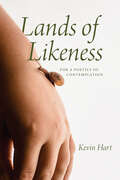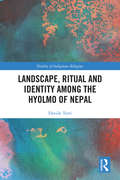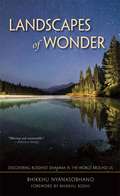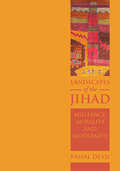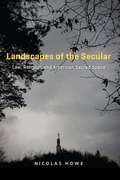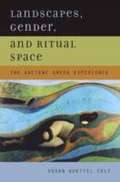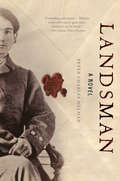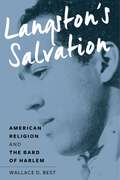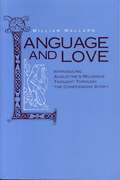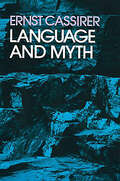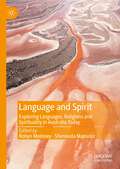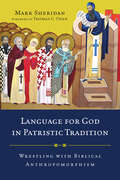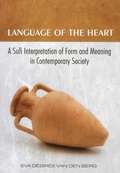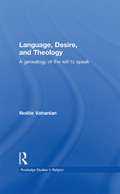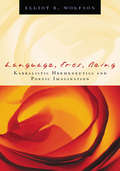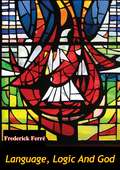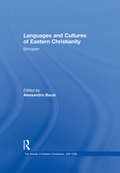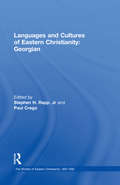- Table View
- List View
Lands of Likeness: For a Poetics of Contemplation
by Kevin HartAn original and profound exploration of contemplation from philosopher, theologian, and poet Kevin Hart. In Lands of Likeness, Kevin Hart develops a new hermeneutics of contemplation through a meditation on Christian thought and secular philosophy. Drawing on Kant, Schopenhauer, Coleridge, and Husserl, Hart first charts the emergence of contemplation in and beyond the Romantic era. Next, Hart shows this hermeneutic at work in poetry by Gerard Manley Hopkins, Marianne Moore, Wallace Stevens, and others. Delivered in its original form as the prestigious Gifford Lectures, Lands of Likeness is a revelatory meditation on contemplation for the modern world.
Lands of Likeness: For a Poetics of Contemplation
by Kevin HartAn original and profound exploration of contemplation from philosopher, theologian, and poet Kevin Hart. In Lands of Likeness, Kevin Hart develops a new hermeneutics of contemplation through a meditation on Christian thought and secular philosophy. Drawing on Kant, Schopenhauer, Coleridge, and Husserl, Hart first charts the emergence of contemplation in and beyond the Romantic era. Next, Hart shows this hermeneutic at work in poetry by Gerard Manley Hopkins, Marianne Moore, Wallace Stevens, and others. Delivered in its original form as the prestigious Gifford Lectures, Lands of Likeness is a revelatory meditation on contemplation for the modern world.
Landscape of Hope: An Illustrated Journey Into the Psalms
by Heather HoldsworthThe world is noisy and disorientating. Our hearts need beauty and truth.Heather Holdsworth experienced the death of her father followed shortly by the death of her mother. A few years later she battled a sickness that left her without the strength to stand, walk, or even speak. She opened the book of Psalms. She began writing. And from her writing emerged drawings that brought solace and joy to her soul.Through the medium of art and words, artist and Bible teacher Heather Holdsworth shares an illustrated journey into the Psalms. Landscape of Hope takes passages that have become familiar—perhaps too familiar—and reveals their soul-strengthening, heart-restoring power. Through artwork and commentary, readers find themselves deeply engaging with the Bible and the triune God.Heather invites us to come alongside her in discovering the artistry, symmetry, and wonder of this ancient text. Readers experience the presence of Jesus Christ as they engage with the truth of life&’s fragility and find hope in a renewed vision of God.
Landscape, Ritual and Identity among the Hyolmo of Nepal: The Buddha and the Drum (Vitality of Indigenous Religions)
by Davide TorriThis book analyses the social, political and religious life of the Hyolmo people of Nepal. Highlighting patterns of change and adaptation, it addresses the Shamanic-Buddhist interface that exists in the animated landscape of the Himalayas. Opening with an analysis of the ethnic revival of Nepal, the book first considers the Himalayan religious landscape and its people. Specific attention is then given to Helambu, home of the Hyolmo people, within the framework of Tibetan Buddhism. The discussion then turns to the persisting shamanic tradition of the region and the ritual dynamics of Hyolmo culture. The book concludes by considering broader questions of Hyolmo identity in the Nepalese context, as well as reflecting on the interconnection of landscape, ritual and identity. Offering a unique insight into a fascinating Himalayan culture and its formation, this book will be of great interest to scholars of indigenous peoples and religion across religious studies, Buddhist studies, cultural anthropology and South Asian studies.
Landscapes of Wonder
by Bhikkhu Bodhi Bhikkhu Nyanasobhano"To most of us there have come exceptional, unworldly moments, like unsuspected deeps in a stream, when we fell through appearances - fell through ourselves - into an intuition of majesty and wonder." - Bhikkhu Nyanasobhano in Landscapes of Wonder Landscapes of Wonder deftly transports the spirit of Buddhist contemplation off the cushion and into the natural world. With a lyricism and spiritual immediacy reminiscent of Thoreau and Emerson, in eighteen meditational essays Bhikkhu Nyanasobhano considers Buddhist themes through the prism of nature. The reflections captured in these satisfying literary explorations will appeal to all who appreciate contemplation of the natural world and our place in it.
Landscapes of the JIHAD: Militancy, Morality, Modernity
by Faisal DevjiWhat are the motives behind Osama bin Laden's and Al-Qaeda's jihad against America and the West? Innumerable attempts have been made in recent years to explain that mysterious worldview. In Landscapes of the Jihad, Faisal Devji focuses on the ethical content of this jihad as opposed to its purported political intent. Al-Qaeda differs radically from such groups as Egypt's Muslim Brotherhood and Indonesia's Jemaah Islamiyah, which aim to establish fundamentalist Islamic states. In fact, Devji contends, Al-Qaeda, with its decentralized structure and emphasis on moral rather than political action, actually has more in common with multinational corporations, antiglobalization activists, and environmentalist and social justice organizations. Bin Laden and his lieutenants view their cause as a response to the oppressive conditions faced by the Muslim world rather than an Islamist attempt to build states.Al-Qaeda culls diverse symbols and fragments from Islam's past in order to legitimize its global war against the "metaphysical evil" emanating from the West. The most salient example of this assemblage, Devji argues, is the concept of jihad itself, which Al-Qaeda defines as an "individual duty" incumbent on all Muslims, like prayer. Although medieval Islamic thought provides precedent for this interpretation, Al-Qaeda has deftly separated the stipulation from its institutional moorings and turned jihad into a weapon of spiritual conflict. Al-Qaeda and its jihad, Devji suggests, are only the most visible manifestations of wider changes in the Muslim world. Such changes include the fragmentation of traditional as well as fundamentalist forms of authority. In the author's view, Al-Qaeda represents a new way of organizing Muslim belief and practice within a global landscape and does not require ideological or institutional unity. Offering a compelling explanation for the central purpose of Al-Qaeda's jihad against the West, the meaning of its strategies and tactics, and its moral and aesthetic dimensions, Landscapes of the Jihad is at once a sophisticated work of historical and cultural analysis and an invaluable guide to the world's most prominent terrorist movement.
Landscapes of the Secular: Law, Religion, and American Sacred Space
by Nicolas Howe“What does it mean to see the American landscape in a secular way?” asks Nicolas Howe at the outset of this innovative, ambitious, and wide-ranging book. It’s a surprising question because of what it implies: we usually aren’t seeing American landscapes through a non-religious lens, but rather as inflected by complicated, little-examined concepts of the sacred. Fusing geography, legal scholarship, and religion in a potent analysis, Howe shows how seemingly routine questions about how to look at a sunrise or a plateau or how to assess what a mountain is both physically and ideologically, lead to complex arguments about the nature of religious experience and its implications for our lives as citizens. In American society—nominally secular but committed to permitting a diversity of religious beliefs and expressions—such questions become all the more fraught and can lead to difficult, often unsatisfying compromises regarding how to interpret and inhabit our public lands and spaces. A serious commitment to secularism, Howe shows, forces us to confront the profound challenges of true religious diversity in ways that often will have their ultimate expression in our built environment. This provocative exploration of some of the fundamental aspects of American life will help us see the land, law, and society anew.
Landscapes, Gender, and Ritual Space (The Ancient Greek Experience)
by Susan Guettel ColeThe division of land and consolidation of territory that created the Greek polis also divided sacred from productive space, sharpened distinctions between purity and pollution, and created a ritual system premised on gender difference. Regional sanctuaries ameliorated competition between city-states, publicized the results of competitive rituals for males, and encouraged judicial alternatives to violence. Female ritual efforts, focused on reproduction and the health of the family, are less visible, but, as this provocative study shows, no less significant. Taking a fresh look at the epigraphical evidence for Greek ritual practice in the context of recent studies of landscape and political organization, Susan Guettel Cole illuminates the profoundly gendered nature of Greek cult practice and explains the connections between female rituals and the integrity of the community. In a rich integration of ancient sources and current theory, Cole brings together the complex evidence for Greek ritual practice. She discusses relevant medical and philosophical theories about the female body; considers Greek ideas about purity, pollution, and ritual purification; and examines the cult of Artemis in detail. Her nuanced study demonstrates the social contribution of women's rituals to the sustenance of the polis and the identity of its people.
Landsman: A Novel
by Peter MelmanAs fictional characters go, few embody such striking contradictions as cardsharp Elias Abrams: Jewish by birth, he joins the Confederate Army during the Civil War. Indeed, the question of duality runs deep through this novel — not only is Elias a Jew defending the right to oppress a people, but after he helps to commit a horrific crime, he finds himself unexpectedly overtaken by the power of love. Exploring themes of literature, redemption, atonement, and love, this novel delivers a startling dose of moral ambiguity, keen insights into the human condition, and unexpected moments that devastate with their casual simplicity.
Laney's Kiss
by Tracey Victoria BatemanHistorical Christian romance set on the Kansas prairie during the late 1870s.
Langston's Salvation: American Religion and the Bard of Harlem
by Wallace D. BestWinner of the 2018 Award for Excellence in the Study of Religion in Textual Studies, presented by the American Academy of Religion 2018 Outstanding Academic Title, given by Choice MagazineA new perspective on the role of religion in the work of Langston HughesLangston's Salvation offers a fascinating exploration into the religious thought of Langston Hughes. Known for his poetry, plays, and social activism, the importance of religion in Hughes’ work has historically been ignored or dismissed. This book puts this aspect of Hughes work front and center, placing it into the wider context of twentieth-century American and African American religious cultures. Best brings to life the religious orientation of Hughes work, illuminating how this powerful figure helped to expand the definition of African American religion during this time. Best argues that contrary to popular perception, Hughes was neither an avowed atheist nor unconcerned with religious matters. He demonstrates that Hughes’ religious writing helps to situate him and other black writers as important participants in a broader national discussion about race and religion in America. Through a rigorous analysis that includes attention to Hughes’s unpublished religious poems, Langston’s Salvation reveals new insights into Hughes’s body of work, and demonstrates that while Hughes is seen as one of the most important voices of the Harlem Renaissance, his writing also needs to be understood within the context of twentieth-century American religious liberalism and of the larger modernist movement. Combining historical and literary analyses with biographical explorations of Langston Hughes as a writer and individual, Langston’s Salvation opens a space to read Langston Hughes’ writing religiously, in order to fully understand the writer and the world he inhabited.
Language Learning and Teaching in Missionary and Colonial Contexts: L'apprentissage et l'enseignement des langues en contextes missionnaire et colonial (Languages and Culture in History)
by Dan Savatovsky Mariangela Albano Thị Kiều Ly Phạm Valérie SpaëthThis volume assembles texts dedicated to the linguistic and educational aspects of missionary and colonial enterprises, taking into account all continents and with an extended diachronic perspective (15th–20th centuries). Strictly speaking, this “linguistics” is contemporary to the colonial era, so it is primarily the work of missionaries of Catholic orders and Protestant societies. It can also belong to a retrospective outlook, following decolonization. In the first category, one mostly finds transcription, translation, and grammatization practices (typically, the production of dictionaries and grammar books). In the second category, one finds in addition descriptions of language use, of situations of diglossia, and of contact between languages. Within this framework, the volume focuses on educational and linguistic policies, language teaching and learning, and the didactics that were associated with them.
Language and Love: Introducing Augustine's Religious Thought Through the Confessions Story (G - Reference, Information and Interdisciplinary Subjects)
by William MallardThis is the first work to combine an introduction to Augustine's Confessions with a larger outline of his mature theology. Mallard provides guidance for reading the narrative Confessions (Books I–IX) and at the same time, by certain extensions and comments, reveals the three major topical divisions within Augustine's thought: creation, salvation, and the City of God. Mallard is able to do this because Augustine's affirmation of the good of Creation, his view of the human will and God's grace (and the nature of evil), his sense of a religious people's identity and their hope, and his view of faith and reason were all essentially in place at the time of the Confessions.Mallard argues that Augustine was not "in search of himself" in a modern sense but in search of a language of prayer, praise, and truth that would locate him within God's grace. That language turned out to be the language of Incarnation, which remains compelling and inviting today. As a classic work, the Confessions is a monument to its own time, but it has striking resonances for our own. Mallard's interpretation will challenge readers to begin working out their own. The Confessions endures because it is a story that illumines the stories of many, even to the present day. To analyze how it is like, and unlike, modern experiences is to exercise both mind and heart. In that respect, Language and Love is a kind of theological meditation on the Confessions testing out a horizon of belief. Mallard views Augustine as a master of the spoken word in an age of broken and abused language and the Confessions as a historic masterpiece of rhetoric. He contends that Augustine is the ancestor of many today who offer social and political hope through fresh rhetorical vitality.
Language and Myth
by Ernst CassirerIn this important study Ernst Cassirer analyzes the non-rational thought processes that go to make up culture. He demonstrates that beneath both language and myth there lies an unconscious "grammar" of experience, whose categories and canons are not those of logical thought. He shows that this prelogical "logic" is not merely an undeveloped state of rationality, but something basically different, and that this archaic mode of thought still has enormous power over even our most rigorous thought, in language, poetry and myth.The author analyzes brilliantly such seemingly diverse (yet related) phenomena as the metaphysics of the Bhagavat Gita, the Melanesian concept of Mana, the Naturphilosophie of Schelling, modern poetry, Ancient Egyptian religion, and symbolic logic. He covers a vast range of material that is all too often neglected in studies of human thought.These six essays are of great interest to the student of philosophy or the philosophy of science, the historian, or the anthropologist. They are also remarkably timely for students of literature, what with the enormous emphasis placed upon "myth" in modern literary speculation. This book is not superficial speculation by a dabbler, but a penetrating study by one of the most profound and sensitive philosophic minds of our time.
Language and Religion: A Journey into the Human Mind
by William DownesLanguage and Religion offers an innovative theory of religion as a class of cultural representations, dependent on language to unify diverse capacities of the human mind. It argues that religion is widespread because it is implicit in the way the mind processes the world, as it determines what we ought to do, practically and morally, to achieve our goals. Focusing on the world religions, the book relates modern cognitive theories of language and communication to culture and its dissemination. It explains basic features of religion such as the supernatural, the normative, abstract and ideal theological concepts such as 'God', and religious feeling. It develops a linguistic theory, based on how utterances are understood, of metaphysical and moral 'mysteries' and their key role in thought and action. It shows how such concepts gain strength in the light of their successful use, and when tempered by criticism, can also have genuine authority.
Language and Spirit: Exploring Languages, Religions and Spirituality in Australia Today
by Robyn Moloney Shenouda MansourThis edited book explores stories of linguistic and spiritual identity in the urban and rural Australian landscape. It is an innovative mix of thirty six personal narratives and eleven research studies, which together offer accounts of the intersection of languages, religion and spirituality in people’s lives. Teachers of Indigenous languages speak of the critical connection between language revitalization, the spirituality of Country, and well-being. Both new and long-established diaspora individuals speak of the often complex but vital joint role of language and faith in belonging and heritage. The new dimension which the book brings to multilingualism is relevant to all complex global societies. Language and Spirit is ideal for both the general reader interested in community languages and interfaith issues, and academics in global intercultural studies and Applied Linguistics study wishing to gain a nuanced insight into the Language and Spirit intersection.
Language and the Declining World in Chaucer, Dante, and Jean de Meun
by John M. FylerMedieval commentaries on the origin and history of language used biblical history, from Creation to the Tower of Babel, as their starting-point, and described the progressive impairment of an originally perfect language. Biblical and classical sources raised questions for both medieval poets and commentators about the nature of language, its participation in the Fall, and its possible redemption. John M. Fyler focuses on how three major poets - Chaucer, Dante, and Jean de Meun - participated in these debates about language. He offers fresh analyses of how the history of language is described and debated in the Divine Comedy, the Canterbury Tales and the Roman de la Rose. While Dante follows the Augustinian idea of the Fall and subsequent redemption of language, Jean de Meun and Chaucer are skeptical about the possibilities for linguistic redemption and resign themselves, at least half-comically, to the linguistic implications of the Fall and the declining world.
Language for God in Patristic Tradition: Wrestling with Biblical Anthropomorphism
by Mark SheridanLanguage for God in Patristic Tradition
Language in Time of Revolution
by Benjamin HarshavThis book deals with two remarkable events--the worldwide transformations of the Jews in the modern age and the revival of the ancient Hebrew language. It is a book about social and cultural history addressed not only to the professional historian, and a book about Jews addressed not only to Jewish readers. It tries to rethink a wide field of cultural phenomena and present the main ideas to the intelligent reader, or, better, present a "family picture" of related and contiguous ideas. Many names and details are mentioned, which may not all be familiar to the uninitiated; their function is to provide some concrete texture for this dramatic story, but the focus is on the story itself.
Language of the Heart: A Sufi Interpretation of Form (Sura) and Meaning (Mana) in Contemporary Society
by Eva Desiree van den BergThis book seeks to examine how Sufi thought might provide critical understanding of contemporary life and a pathway towards the recovery of a more meaningful existence. Rumi&’s mystical teachings are of great value at a time of rampant materialism and indiscriminate consumerism, and have the potential to illuminate the precarious state of the world, as well as revitalize contemporary social critique, eco-philosophy and bio-semiotics in what is increasingly being regarded as a post-secular age.
Language, Desire and Theology: A Genealogy of the Will to Speak (Routledge Studies in Religion)
by Noëlle VahanianThis interesting and provocative work develops a new theological approach to language in the light of contemporary critical theory.
Language, Eros, Being: Kabbalistic Hermeneutics and Poetic Imagination
by Elliot R. WolfsonThis long-awaited, magisterial study-an unparalleled blend of philosophy, poetry, and philology-draws on theories of sexuality, phenomenology, comparative religion, philological writings on Kabbalah, Russian formalism, Wittgenstein, Rosenzweig, William Blake, and the very physics of the time-space continuum to establish what will surely be a highwater mark in work on Kabbalah. Not only a study of texts, Language, Eros, Being is perhaps the fullest confrontation of the body in Jewish studies, if not in religious studies as a whole.Elliot R. Wolfson explores the complex gender symbolism that permeates Kabbalistic literature. Focusing on the nexus of asceticism and eroticism, he seeks to define the role of symbolic and poetically charged language in the erotically configured visionary imagination of the medieval Kabbalists. He demonstrates that the traditional Kabbalistic view of gender was a monolithic and androcentric one, in which the feminine was conceived as being derived from the masculine. He does not shrink from the negative implications of this doctrine, but seeks to make an honest acknowledgment of it as the first step toward the redemption of an ancient wisdom.Comparisons with other mystical traditions-including those in Christianity, Buddhism, and Islam-are a remarkable feature throughout the book. They will make it important well beyond Jewish studies, indeed, a must for historians of comparative religion, in particular of comparative mysticism.Praise for Elliot R. Wolfson:"Through a Speculum That Shines is an important and provocative contribution to the study of Jewish mysticism by one of the major scholars now working in this field."-Speculum
Language, Logic And God
by Frederick Ferré"THIS BOOK is an attempt to fill the present striking need for an introduction to contemporary linguistic philosophy as it bears on theological discourse. Wherever I have gone, recently, among educated Christians in Britain and America, I have encountered profound curiosity--and a good deal of anxiety--concerning modern methods in philosophy as they relate to the logical nature and validity of theological affirmations. Similarly I have found many of my students in contemporary philosophy and in the philosophy of religion becoming deeply absorbed in the issues raised by a critical examination of theological speech. From both groups, the intellectually alert Christians and the thoughtful graduate and undergraduate students of philosophy and religion, I have been heavily bombarded with appeals for direction to some book which would (1) set forth the central issues and arguments concerning theological discourse for readers who have familiarity with traditional philosophy but who are relatively untrained in contemporary philosophical practices and (2) place into perspective the present state of philosophical and theological discussion in this area of burgeoning interest. To my frustration, I have had to answer such requests with the admission that no such book exists and with the promise that I would try, some day, to provide that book myself. In preparing this volume, therefore, I have done my best to keep those promises in mind."
Languages and Cultures of Eastern Christianity: Ethiopian (The Worlds of Eastern Christianity, 300-1500 #4)
by Alessandro BausiThis volume brings together a set of contributions, many appearing in English for the first time, together with a new introduction, covering the history of the Ethiopian Christian civilization in its formative period (300-1500 AD). Rooted in the late antique kingdom of Aksum (present day Northern Ethiopia and Eritrea), and lying between Byzantium, Africa and the Near East, this civilization is presented in a series of case studies. At a time when philological and linguistic investigations are being challenged by new approaches in Ethiopian studies, this volume emphasizes the necessity of basic research, while avoiding the reduction of cultural questions to matters of fact and detail.
Languages and Cultures of Eastern Christianity: Georgian (The Worlds of Eastern Christianity, 300-1500 #5)
by Stephen H. Rapp Paul CregoThis volume brings together a set of key studies on the history and culture of Christian Georgia, along with a substantial new introduction. The opening section sets the regional context, in relation to the Byzantine empire in particular, while subsequent parts deal with the conversion and christianization of the country, the making of a 'national' church and the development of a historical identity.
